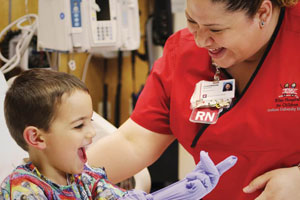
Indiana University School of Medicine Child Protection Program (IUCPP) is a division of the Department of Pediatrics providing comprehensive, trauma-informed consultation for children suspected of maltreatment. We offer a wide range of services to children, families and professionals, including:
- Medical evaluation of suspected victims of child abuse and/or neglect
- Comprehensive medical, developmental and behavioral assessment for children newly entering the foster care system by Department of Child Services (DCS) referral only
- Professional/expert consultation for community partners and healthcare providers
- Expert testimony in legal settings when required
- Professional education
Our faculty members are board-certified in Child Abuse Pediatrics and work alongside an expert team of nurse practitioners, registered nurses, licensed clinical social workers, health educators and support staff all dedicated to advancing the care of this population and their families.
Programs & Initiatives
Here are some of our programs making a difference across the state of Indiana:
- Pediatric Center of Hope (PCOH): Outpatient clinic that provides a comprehensive trauma-informed consultation and education for children alleged of being sexually abused.
- Child Abuse Consultation Service: This service provides comprehensive medical evaluations for children referred to our program by medical providers or DCS with allegations of physical abuse or neglect.
- Pediatric Evaluation and Diagnostic Services (PEDS) Program: This program provides statewide multidisciplinary education on medical issues relating to child maltreatment and offers consultation to the DCS on cases of suspected child maltreatment.
- Foster Care Bridge Clinic: Outpatient trauma-informed, multidisciplinary clinic providing comprehensive healthcare and resources for children entering and making transitions within the foster care system by DCS referral only.
- Active community involvement: Our division members actively serve on numerous committees addressing child maltreatment issues. Some of these organizations include the Marion County Child Fatality Review Team, Indiana State Child Fatality Review Team, Marion County Child Protection Team and Indiana Children’s Justice Act Task Force. We also serve as the medical provider for many child protection centers in Central Indiana.
- Docs InCASE (Doctors for Indiana Child Abuse Screening and Education): Partnership with pediatricians across Indiana who provide local expertise and assistance to DCS through consultation and participation in community child advocacy teams. They additionally participate in educational trainings and case reviews around child protection issues.
The IUCPP aims to provide evidence-based medical evaluations to address a child’s injuries–whether a medical condition or accidental or abusive scenario–to best explain a child’s condition. At each step of the way, our specialists are here to help and protect every child in need.
Important Contact Information
To contact the IUCPP, call 317.274.2617 or email us at iucpp@iu.edu.
Health Professionals
For Health Professionals
Refer A Patient

Riley at IU Health works with referring physicians in Indiana and beyond.
Refer A PatientEducation
The Child Abuse Pediatrics Fellowship is an accredited three-year subspecialty program providing multidisciplinary training and experience for a pediatrician to become an expert in child abuse pediatrics. We have one of only 13 Child Abuse Pediatrics Fellowship programs certified by the Accreditation Council for Graduate Medical Education (ACGME).
Recent Research/Publications
Campbell, A.M., & Thompson, S.L. (2015). The emotional maltreatment of children in domestically violent homes: Identifying gaps in education and addressing common misconceptions. Child Abuse & Neglect, 48, 39-49. doi:10.1016/j.chiabu.2015.08.009.

